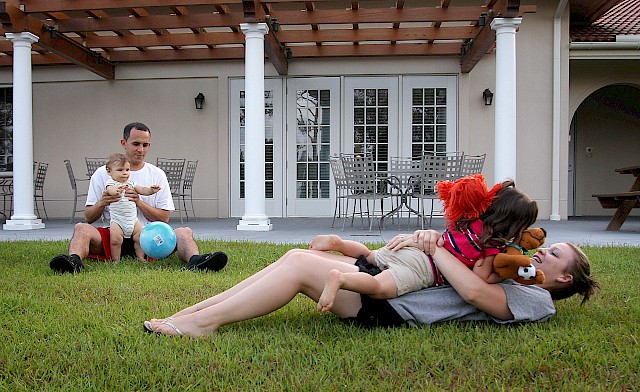It might be the well-stocked kitchens, the shelves of movies or the wheelchair-accessible showers that have drawn hundreds of thousands of military members, veterans and their families to Fisher Houses over the past three decades. But a better guess is it's the comfort and care they receive while there — and the fact that it's free — that really drives guests to want to stay there.
Fisher Houses can be found on several military installations and near Department of Veterans Affairs hospitals around the world. While most civilians have heard of [redacted] St. Jude Children's Research Hospital — both of which house and support families of children receiving medical care at no cost — many people may not know that Fisher Houses offer that same sort of immense help to the military and veteran community.
Fisher Houses, built by a private foundation, are run by the Defense Department or VA, and they allow military members, veterans, their families and their confidants of any age to stay at no cost while their loved one receives treatment and/or rehabilitation. And there's no time limit on their stays, meaning people can room there for one night or several months.
"You think of all the money that somebody can save," said Michelle Horn, the vice president of communications at Fisher House Foundation, which builds the houses.
Taking a Tour
When you pull up to a Fisher House, they're very unassuming in their looks from the outside. Once you see what's available inside, however, you realize that the comfort they offer their guests is invaluable.
Take, for instance, the Fisher House at Fort Belvoir, Virginia, which opened in 2012. I recently took a tour to get a feel for the accommodations and immediately felt the warmth of the place upon entry. Modern furniture lined the living and dining area, exuding an aesthetic that was cozy and calm. Shelves were lined with books, vases and movies.
I was welcomed immediately by Horn and the house's two staff members, house manager Tyana Monette and operations assistant Melissa Laundre, the latter of whom happens to be a military spouse. We first wandered through the community kitchen, which had plenty of space for its guests to gather, cook a huge meal or just nibble on the plethora of snacks already provided.
Next, we ventured into the dining area, which is used often because food and drink aren't allowed in the bedrooms. Staff said the rule is meant to keep things tidy but also to promote community. It's in that space that a lot of guests have really gotten to know each other.
"People become really close. They're going through hard times," Horn said. "[It's nice to] have someone to lean on and to talk to, but also sometimes to share the dark humor and be the person who gets it."
"It's one thing for them to vent to us," Monette said. "Me personally, I can't really relate to some of their experiences, but to see them to vent to each other — it's really nice to see that."
Horn said most of the houses are wide, single story and don't have carpet, so they're handicap accessible. The few houses that do have more than one floor have elevators. Each house also displays photos and artwork that depicts the nearby community. At Belvoir, many of the framed photos show iconic images from Washington, D.C.
The Belvoir Fisher House has 12 bedrooms, a few of which have adjoining rooms for families. The rooms themselves were akin to an upscale hotel — finely crafted furniture, plenty of natural light and large bathrooms, all of which have wheelchair accessible showers.
During the tour, we met Retired Air Force Lt. Col. Edward Gray in one of the common areas. He'd been staying at the house for about six weeks as he received outpatient treatment after a kidney transplant.
Gray, whose service began in 1972, had a long career that included flying B-52 bombers, being a backup pilot for Air Force One and working as an ROTC instructor. When he first came to the Fisher House, he said he had no expectations. But six weeks later, he couldn't say enough about his appreciation for Monette and Laundre.
"Without them, I couldn't have made it," he said. "They know what they're doing."
Can I Stay at a Fisher House?
To be eligible to stay at a Fisher House, you must be a patient, a family member or the caretaker of a patient at a military or VA hospital, or a private hospital that's received a referral from one of those departments.
Most guests receive a referral to stay at the houses, either from a case manager, social worker or noncommissioned officer, but patients can contact the houses directly. For current service members, Horn said it's really important that NCOs are aware of Fisher House's services.
"We want all leaders to know about Fisher House so they can share with their teams. In an emergency, we know the first line supervisors ensure service members are taken care of," Horn said. "We want them to know about this invaluable resource that can make a huge difference in a family's medical journey."
If you need help or want to refer a patient, visit www.fisherhouse.org, identify the Fisher House closest to your medical facility and talk with the house manager, who can walk you through the process.
If you're not sure you qualify, contact them anyway. Horn said some houses offer exceptions to policy on a case-by-case basis.
And if you're not sure you want to stay there? Give them a call — they'll give you a tour, too, to help you decide!
How Do Fisher Houses Work?
Through a public-private partnership, the DOD or VA submits a list of needs to the Fisher House Foundation, which then works with the departments and the community to identify land for a house to be built. The foundation builds the house, then gives it back to the DOD or VA to manage once it's complete.
There's a lot of community involvement, too. Horn said many community groups — even former guests — collect donations such as gift cards and food for Fisher House guests, and even host activities. Local police departments and the accompanying hospitals also offer their support.
The first Fisher House was built at National Naval Medical Center, now Walter Reed National Military Medial Center, in Bethesda, Maryland, in 1990. There are currently 94 Fisher Houses across the U.S., but more are in construction. Horn said the foundation is hoping to have its 100th house built in Atlanta by the end of 2024. As of May 2023, the houses have served more than 455,000 military and veteran families, saving them more than $575 million in lodging and transportation costs.
Fisher House Foundation also has its Hotels for Heroes and Hero Miles programs. Hotels for Heroes uses donated hotel points so families can stay at hotels near medical centers if a Fisher House is booked up or unavailable. The Hero Miles program uses donated frequent flier miles to get families to the houses at no cost. Horn said the miles and points can also be donated to other programs that support veterans and service members, such as suicide prevention programs or family programs at the Warrior and Invictus games.







